Broncia Koller-Pinell
Broncia Koller-Pinell (25 February 1863, Sanok - 26 April 1934, Oberwaltersdorf) was an Austrian Expressionist painter who specialized in portraits and still-lifes.
Broncia Koller-Pinell | |
|---|---|
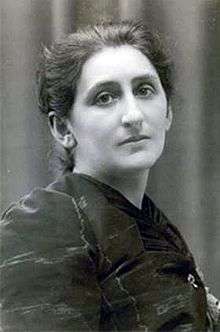 Broncia Koller-Pinell (c.1900) | |
| Born | Bronisława Pineles 25 February 1863 Sanok, Poland |
| Died | 26 April 1934 (aged 71) Oberwaltersdorf, Austria |
| Nationality | Austrian |
| Known for | Painting |
| Movement | Expressionism |
| Spouse(s) | Hugo Koller ( m. 1896) |
Life
She was born as Bronisława Pineles to a Jewish family in what is now Poland. Her father Saul Pineles (1834, Tysmenytsia – 1903, Vienna) was a designer of military fortifications.[1] In 1870, they moved to Vienna to start a manufacturing business (where they changed the family name to "Pinell") and she took private art lessons with Alois Delug.[2] In 1885, she had her first public exhibition. For the next five years, she studied in Munich at the "Damenakademie" of the Munich Artists' Association in the studios of Ludwig von Herterich.[1] This was followed by exhibitions at the Vienna Künstlerhaus, in Munich and in Leipzig.[2] Koller-Pinell exhibited her work at The Woman's Building at the 1893 World's Columbian Exposition in Chicago, Illinois.[3]
In 1896, against her family's wishes, she married the electro-physicist Dr.Hugo Koller (1867-1949), who was a Catholic. Their children were raised as Christians, but she never converted.[1] At first, they lived in Salzburg and Nuremberg, but returned to Vienna in 1902. Shortly after, she was accepted as a member of the Vienna Secession.[2] In 1904, she inherited a house in Oberwaltersdorf. The family soon moved there, and she had it decorated by Josef Hoffmann and Koloman Moser, associates from the Secession. Shortly after, she set up a salon[4] that was frequented by Egon Schiele, Anton Faistauer and Albert Paris Gütersloh, among others.
Her son, Rupert (1896–1976), became a conductor and was briefly married to Anna Mahler. Her daughter Silvia (1898–1963) was also a painter.
Her work was included in the 2019 exhibition City Of Women: Female artists in Vienna from 1900 to 1938 at the Österreichische Galerie Belvedere.[5]
Selected paintings
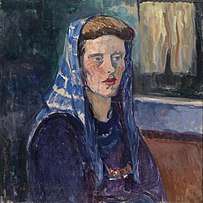 Woman with Blue Headscarf
Woman with Blue Headscarf
(date unknown)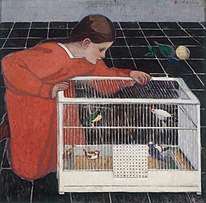 Silvia Koller with Bird Cage (c.1905)
Silvia Koller with Bird Cage (c.1905)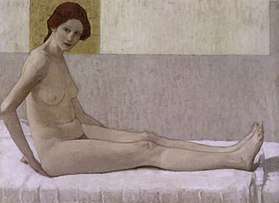 Sitting (1907)
Sitting (1907)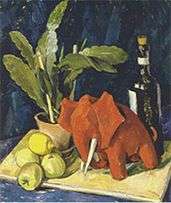 Still-life with Red Elephant (c.1920)
Still-life with Red Elephant (c.1920)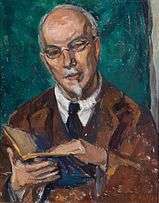 Portrait of Friedrich Eckstein (1920s)
Portrait of Friedrich Eckstein (1920s)
References
- Jewish Women's Archive: Biography by Birgit Ben Eli
- Wacha: "Koller Bronislawa (Bronia)". In: Österreichisches Biographisches Lexikon 1815–1950 (ÖBL). Vol. 4, Austrian Academy of Sciences, Vienna 1969, p. 87 f. (Direct links to "p. 87", "p. 88")
- Nichols, K. L. "Women's Art at the World's Columbian Fair & Exposition, Chicago 1893". Retrieved 3 April 2020.
- Niederösterreichisches Landesmuseum: Brief biography
- "City of Women". Belvedere Museum Vienna. Retrieved 26 June 2020.
Further reading
- Die Malerin Broncia Koller 1863–1934. Exhibition catalog, Niederösterreichisches Landesmuseum, Vienna (1980)
- Tobias G. Natter: Broncia Koller Pinell. Eine Malerin im Glanz der Wiener Jahrhundertwende. Exhibition catalog. Jüdisches Museum, Vienna (1993)
- Boris Manner: Broncia Koller-Pinell 1863–1934. Brandstätter, Vienna (2006) ISBN 3-902510-88-9
External links
| Wikimedia Commons has media related to Broncia Koller-Pinell. |
- ArtNet: More work by Koller-Pinell
- Wien-Vienna Website: "On the Career of Broncia Koller", a book review by Susanne Neuberger
- Broncia Koller-Pinell @ The Blue Lantern
- Literature by and about Broncia Koller-Pinell in the German National Library catalogue